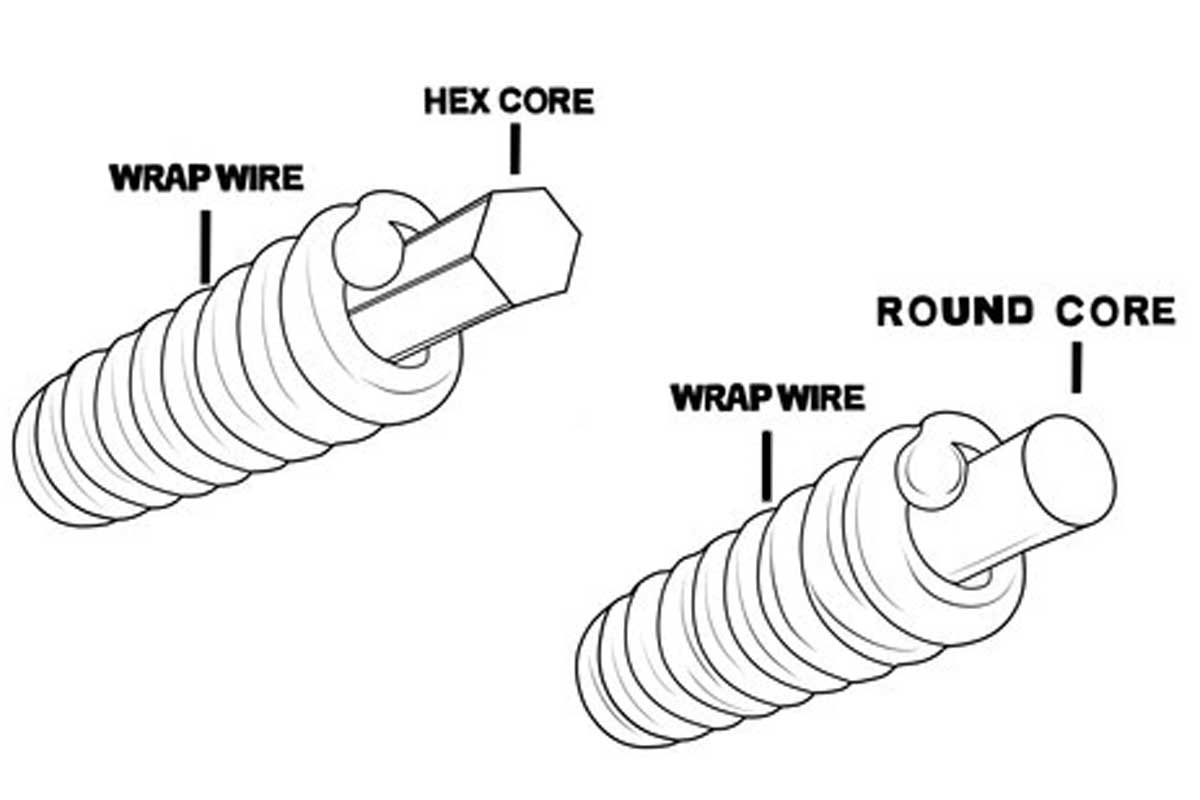When you pluck the strings on a guitar, the sound produced is a fundamental part of the instrument’s appeal. The material composition of guitar strings significantly influences both the tone and the feel of the guitar. What are guitar strings made of though? They’re typically made from a variety of metals, including steel, nickel, bronze and even nylon. Each material contributes to the string’s tension, durability, and the tonal characteristics it imparts to the guitar.
Nylon strings, which are commonly used on classical & flamenco guitars, provide a softer and warmer sound. Steel strings, found on acoustic & electric guitars, offer a brighter and more resonant tone. Metal cores are often wrapped with other materials such as bronze, which can give acoustic guitar strings a crisp and ringing sound, or nickel, which is frequently used for electric guitar strings for a smoother and warmer output.
The gauge, or thickness, of the strings also plays a vital role in the sound of the guitar. Thicker strings generally provide more volume and sustain, whereas lighter strings are easier to play and bend, offering a different expressive potential. The choice of guitar strings can truly transform your playing experience, impacting both the qualitative and sensory aspects of making music with your instrument.

Understanding String Materials
Guitar strings are crafted from a variety of materials, each selected for its impact on tone, playability, and durability. You will find that different materials cater to specific musical needs and preferences.
Steel and Nickel
Steel strings are the backbone of electric and some acoustic guitars, notable for their bright, crisp sound. The core of these strings is usually made of steel, and they’re often wound with nickel-plated steel. This combination offers a balanced tone that’s versatile for many genres. Pure nickel windings provide a warmer sound and were common on vintage guitars.
Stainless steel strings stand out for their corrosion resistance and durability, resulting in a bright, punchy tone that’s favored in rock music. They maintain their brightness longer than nickel-plated strings due to less susceptibility to hand oils and grime.
Bronze and Brass
For acoustic guitars, bronze strings are highly popular. 80/20 bronze, an alloy of 80% copper and 20% zinc, delivers a bright and ringing sound. It amplifies the clear treble tones of the guitar. Over time, they tend to lose some shimmer due to oxidation.
Phosphor bronze strings incorporate phosphor into the alloy, enhancing the string’s life and warmth. This material maintains the tone longer than 80/20 bronze and is a favorite for recording due to its richness and depth.
Brass strings, with their metallic, bright tone, bring a unique sound that’s a bit more treble-focused than bronze. Their clear sound can make a guitar’s chords shimmer.

Nylon and Other Synthetics
Nylon strings are the go-to for classical and flamenco guitars. They’re also used on some folk guitars due to their soft, mellow sound and lower tension. There are varieties of nylon strings: some have a nylon core while others are made of clear or rectified nylon which alters the tone and feel.
Other synthetics, such as fluorocarbons, extend the range of tones available and can mimic gut strings without the associated maintenance and environmental issues.
Coatings and Treatments
Coated strings like Elixir strings carry a protective coating that shields the metal from dirt and moisture, dramatically enhancing longevity. The thin layer helps retain natural tone while extending the life of the strings.
Some players prefer uncoated strings for their raw sound, but those seeking to reduce finger noise and increase playing ease may opt for coated strings. Treatments can also enhance certain tonal characteristics or ease of play, offering you a customized playing experience.
Types of Guitar Strings
When choosing guitar strings, it’s important to match the type of string to your instrument and genre preferences to optimize sound and playability.

Acoustic Guitar Strings
Your acoustic guitar can produce a wide range of sounds depending on the strings you choose. Bronze strings are known for their bright tone, making them a popular choice for a variety of genres. They tend to oxidize fairly quickly, affecting their longevity. For a slightly warmer sound with added durability, phosphor bronze strings incorporate a small percentage of phosphor with the bronze, which helps to preserve the original tone of the string for longer periods.
Related: The Best Acoustic Guitar Strings For Beginners
Electric Guitar Strings
With electric guitars, the type of string can greatly influence the magnetic responsiveness and tone. Nickel-plated steel strings are common and offer a balance of warmth and brightness, suitable for a range of genres. If you’re looking for a brighter, more cutting tone, stainless steel strings are the best choice. They are also more resistant to corrosion, which means they can maintain their tone and feel for longer.
Related: The Best Electric Guitar Strings For Beginners
Classical Guitar Strings
For classical guitars, you’ll typically use nylon guitar strings, which produce a soft, mellow tone ideal for classical and folk genres. The bass strings are usually wound with metals like silver or bronze, whereas the treble strings are made from clear or rectified nylon, each offering a different texture and tonal quality for your classical guitar.
Related: The Best Classical Guitar Strings
Physical Properties and String Construction

Understanding the materials and construction of guitar strings is central to comprehending their playability, tension, and durability. The type of core and winding materials, as well as the gauge and tension of the strings, are critical factors that influence the sound and sustainability of your guitar strings.
Core and Winding Materials
The core wire of a guitar string is fundamental to its construction and often made from steel or nylon. Steel cores offer bright, sharp tones and are typically found in electric and acoustic guitars, while nylon produces a warmer sound, preferred for classical and flamenco guitars. The winding around the core can be made from various metals, including bronze, nickel, and phosphor bronze, each contributing to the string’s overall tone and playability.
Gauge and Tension
String gauge refers to the thickness of your guitar strings and is directly related to playability and tension. Thicker gauges yield a richer, fuller sound, also increasing string tension which can require more finger strength to play. Conversely, lighter gauges are easier to play and ideal for bending notes, but they may break more easily and offer less sustain. Your choice in string gauge influences the guitar’s playability and the physical stress on your instrument.
Related: Guitar String Gauge Chart
Sustainability and Durability
Sustainable string manufacturing focuses on minimizing environmental impact, using recycled materials or less toxic alternatives to traditional metals. Durability is pivotal to string longevity; most strings are treated to resist rust and oxidation, ensuring longer life and consistent quality of tone. When considering sustainability and durability in your guitar strings, you’re not just investing in a product that lasts longer but also one that is more considerate to the environment.
Summary
Guitar strings are an essential component of the instrument’s tone and playability. Typically, guitar strings are made from various materials, each chosen for specific tonal qualities and playing characteristics.
Acoustic guitar strings are usually crafted from:
- Bronze: Bright and clear tone, but tend to oxidize quickly
- Phosphor Bronze: Similar to bronze but with added phosphorus for longer life and warmth
- Silk and Steel: Combine metal with silk or nylon fibers for a softer touch and mellow sound
Electric guitar strings commonly use:
- Nickel-plated steel: Balanced tone, suitable for various playing styles
- Stainless Steel: Bright, crisp sound and resistant to corrosion
- Pure Nickel: Warm, vintage tone popular in traditional blues and rock
Classical guitar strings, played on nylon-string guitars, feature:
- Treble Strings: Made of clear or rectified nylon for a warm, rich sound
- Bass Strings: Silver or gold plated copper wire wound around a nylon core
